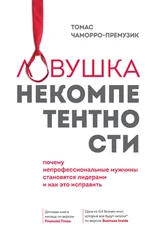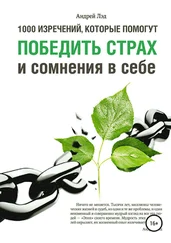“The Biggest Loser,” NBCUniversal, http://www.biggestloser.com/UKedition.
Цитата из личной переписки (июль 2012 г.).
L. Gauvin and J. C. Spence, “Physical Activity and Psychological Well-being: Knowledge Base, Current Issues, and Caveats,” Nutrition Reviews 54, no. 4 (1996): S53–65.
C. B. Taylor, J. F. Sallis, and R. Needle, “The Relation of Physical Activity and Exercise to Mental Health,” Public Health Reports 100, no. 2 (1985): 195–202.
Baumeister et al., “Does High Self-esteem Cause Better Performance?”
Baumeister et al., “Does High Self-esteem Cause Better Performance,” 1.
T. B. Kashdan, V. Barrios, J. P. Forsyth, and M. F. Steger, “Experiential Avoidance as a Generalized Psychological Vulnerability: Comparisons with Coping and Emotion Regulation Strategies,” Behaviour Research and Therapy 44, no. 9 (2006): 1301–20.
W. C. Thompson, G. T. Fong, and D. L. Rosenhan, “Inadmissible Evidence and Juror Verdicts,” Journal of Personality and Social Psychology 40, no. 3 (1981): 453–63.
D. M. Wegner, R. Wenzlaff, R. M. Kerker, and A. E. Beattie, “Incrimination Through Innuendo: Can Media Questions Become Public Answers?” Journal of Personality and Social Psychology 40, no. 5 (1981): 822–32.
A. Tversky and D. Kahneman, “Judgment Under Uncertainty: Heuristics and Biases,” Science 185, no. 4157 (1974): 1124–31.
J. Polivy and C. P. Herman, “Dieting and Binging: A Causal Analysis,” American Psychologist 40, no. 2 (1985): 193–201.
I. L. Janis, “Preventing Pathogenic Denial by Means of Stress Inoculation,” in The Denial of Stress , ed. S. Breznitz (New York: International Universities Press, 1983), 35–76.
J. W. Pennebaker, “Inhibition and Cognition: Toward an Understanding of Trauma and Disease,” Canadian Psychology 26 (1985): 82–95.
J. J. Gross and O. P. John, “Individual Differences in Two Emotion Regulation Processes: Implications for Affect, Relationships, and Well-being,” Journal of Personality and Social Psycholog y 85, no. 2 (2003): 348–62.
R. F. Baumeister and T. F. Heatherton, “Self-regulation Failure: An Overview,” Psychological Inquiry 7 (1996): 1–15.
C. N. Macrae, G. V. Bodenhausen, A. B. Milne, and J. Jetten, “Out of Mind but Back in Sight: Stereotypes on the Rebound,” Journal of Personality and Social Psychology 67, no. 5 (1994): 808–17.
Спросите у себя: «Если бы я мог изменить либо свою уверенность, либо компетентность, что бы я выбрал?» Людей беспокоит собственная уверенность, потому что они считают, что она отражается на их компетентности (например, «У меня социальная тревожность, и это не дает мне общаться с людьми», «Я никогда не научусь плавать, потому что не чувствую себя достаточно уверенным, чтобы зайти в воду»), так что на самом деле им нужно поднять уверенность для того, чтобы улучшить свои результаты.
P. Arden, Whatever You Think, Think the Opposite (New York: Portfolio Trade, 2006), 22.
C. Anderson, S. Brion, D. A. Moore, and J. A. Kennedy, “A Status-Enhancement Account of Overconfidence,” Journal of Personality and Social Psychology 103, no. 4 (2012): 718–35.
D. D. P. Johnson, Overconfidence and War: The Havoc and Glory of Positive Illusions (Cambridge, MA: Harvard University Press, 2004).
Данные относятся главным образом к 2011 году. “World Economic and Financial Surveys: World Economic Outlook Database, April 2012,” International Monetary Fund, http://www.imf.org/external/pubs/ft/weo/2012/01/weodata/index.aspx.
D. Winsborough, R. B. Kaiser, and R. Hogan, “An Evolutionary View: What Followers Want from Their Leaders,” Leadership in Action 29, no. 3 (2009): 8–11.
G. Acs, Downward Mobility from the Middle Class: Waking Up from the American Dream (Pew Charitable Trusts, 2011), http://www.pewtrusts.org/our_work_report_detail.aspx?id=85899363697.
Конец ознакомительного отрывка
Купить книгу







![Марк Макгиннесс - Несмотря ни на что [Как преодолеть страх, неприятие и критику на пути к своей мечте]](/books/393908/mark-makginness-nesmotrya-ni-na-chto-kak-preodolet-thumb.webp)




